Best bike torque wrenches 2026 – tighten your bike bolts to perfection
Never overtighten a bolt again with our pick of the best torque wrenches and torque keys
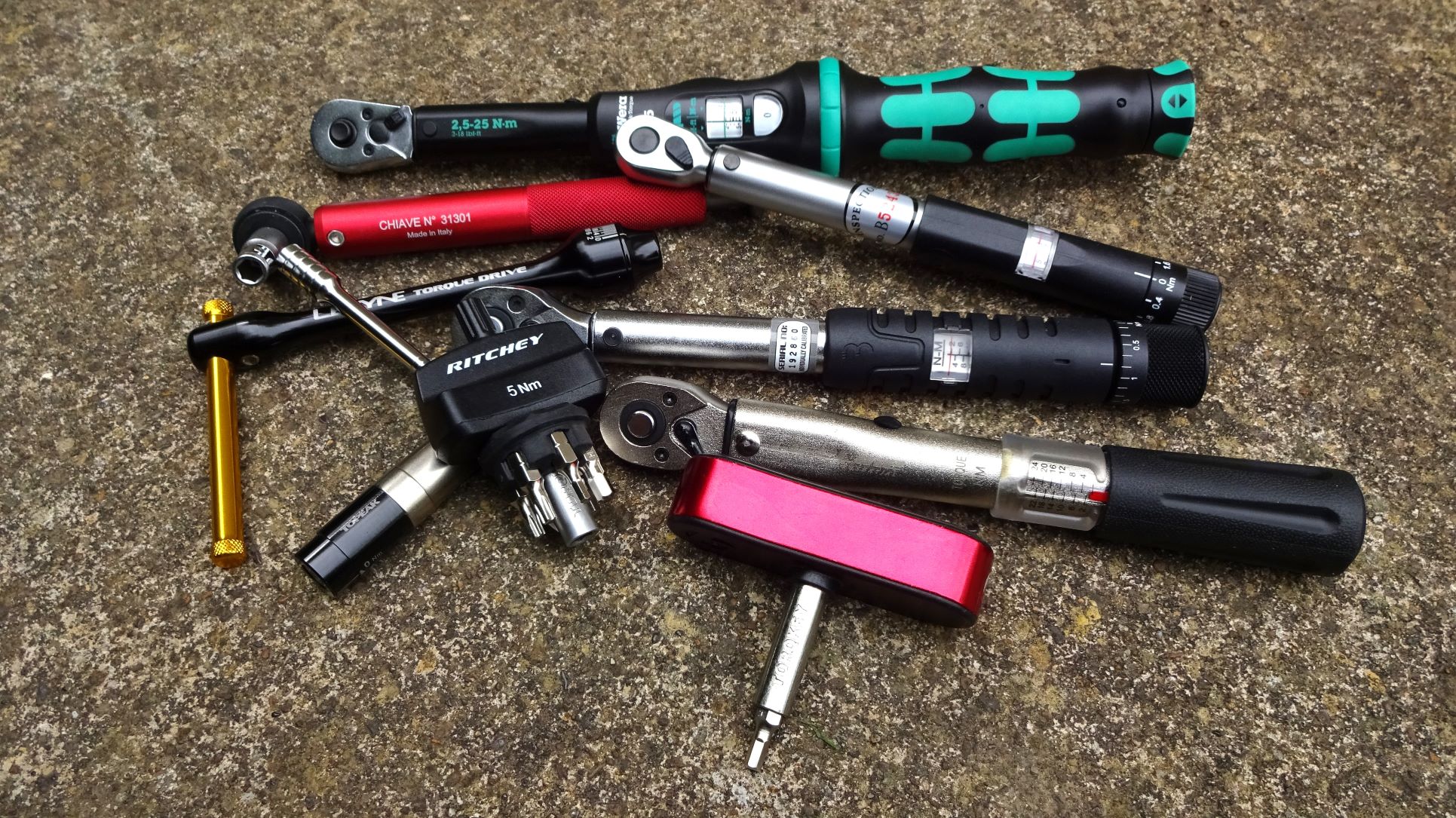
The best bike torque wrenches are a necessary investment if you're doing any serious maintenance on your bike. Even if you're just raising or lowering your saddle or adjusting the position or angle of your handlebars, a torque wrench will help avoid any expensive mistakes.
Many bike parts, such as bolts on seatposts and stems, can be delicate and it's easy to damage them by overtightening the bolts which hold them in position on your bike. That can be a safety risk if a component or the bolt holding it in place breaks while you're riding. There's also a risk of under-tightening bolts resulting in parts slipping or a bolt failing.
Bike makers are very specific about torque wrench precision and there's normally a torque value in Newton meters (Nm) stamped on them. To make sure that you've hit this without overtightening or leaving a bolt too slack, you need a torque wrench.
Our expert reviewers have thoroughly tested a range of the best torque wrenches for bikes both in the workshop and out on the trail to create this guide. Here is our pick of the best, divided into adjustable, portable, and preset options. If you don't know where to start, skip to the bottom of the page to find our guide to what to look for when choosing torque wrenches.
Best bike torque wrenches
Why trust BikePerfect
The quick list
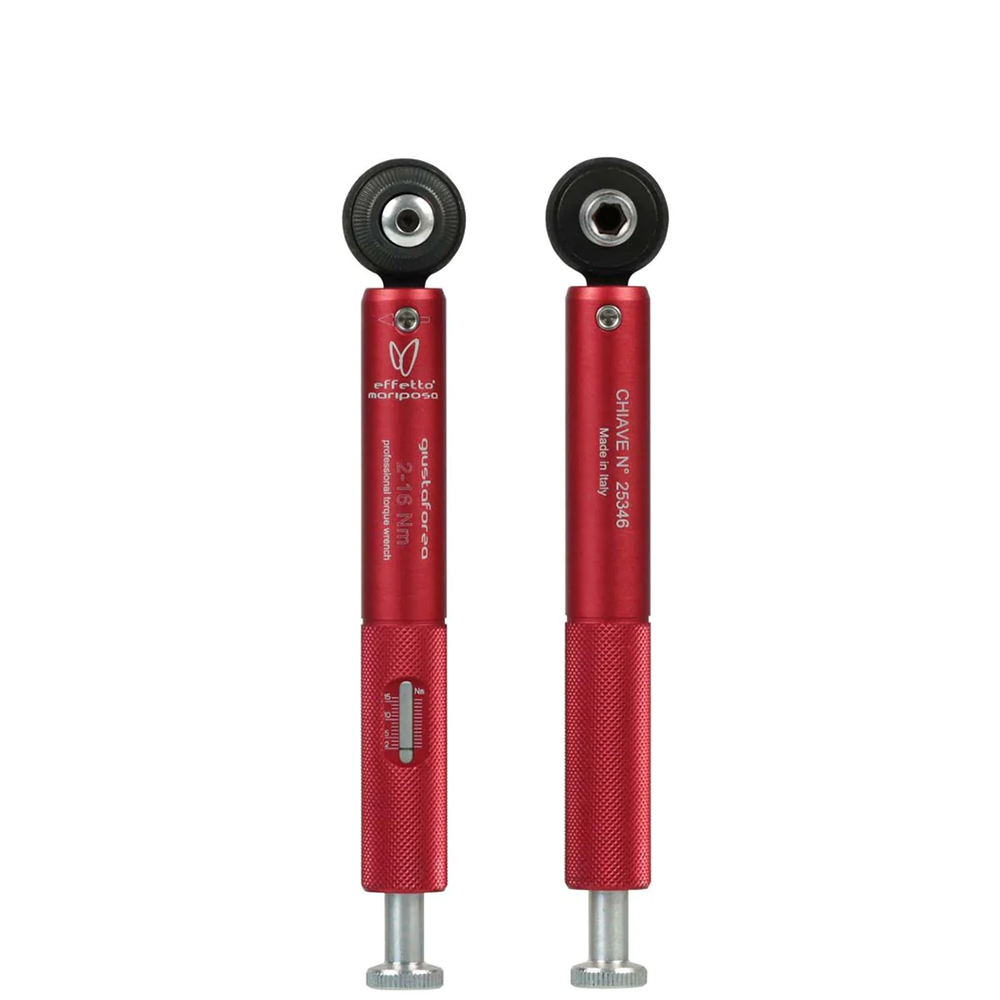
Best precision conventional wrench
Compact, precision calibrated torque wrench with a 2-16Nm range, and a good set of heads supplied.
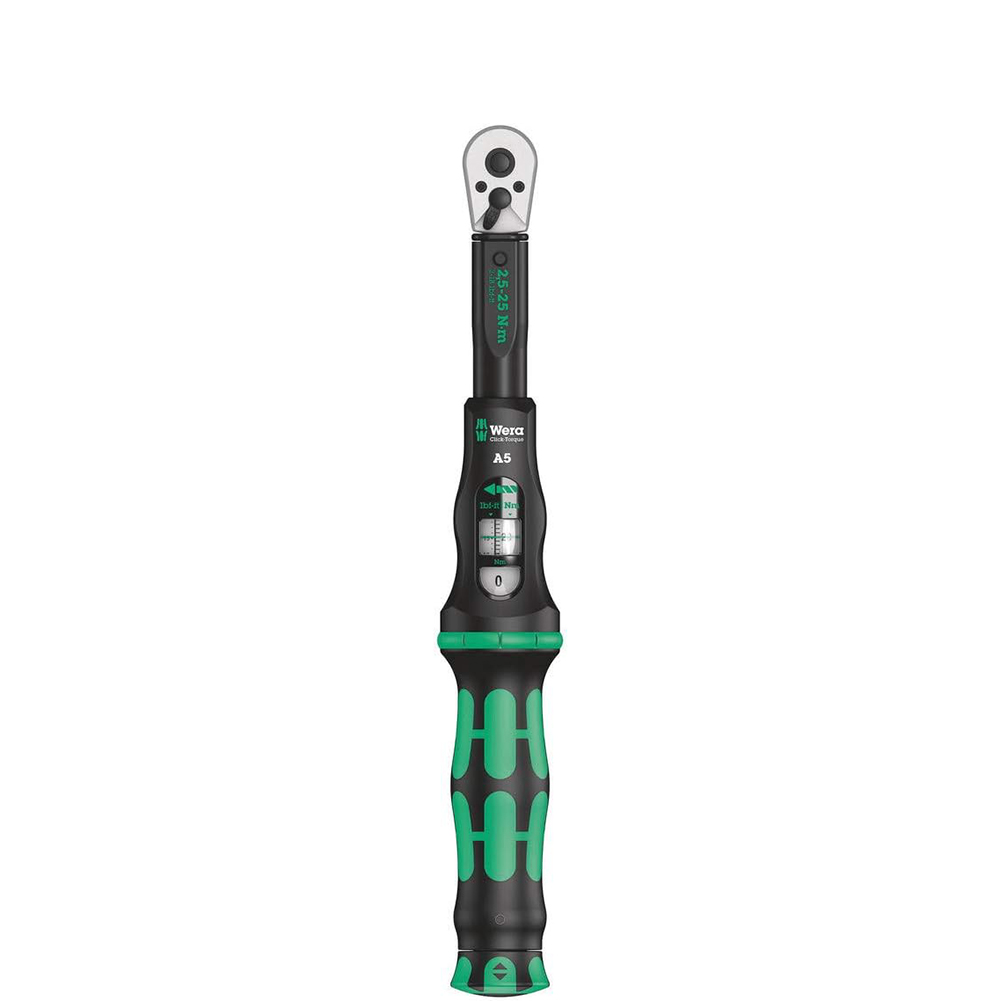
Best workshop-grade wrench
A robust, reliable torque wrench, with easy, precise setting and a lockable gauge.
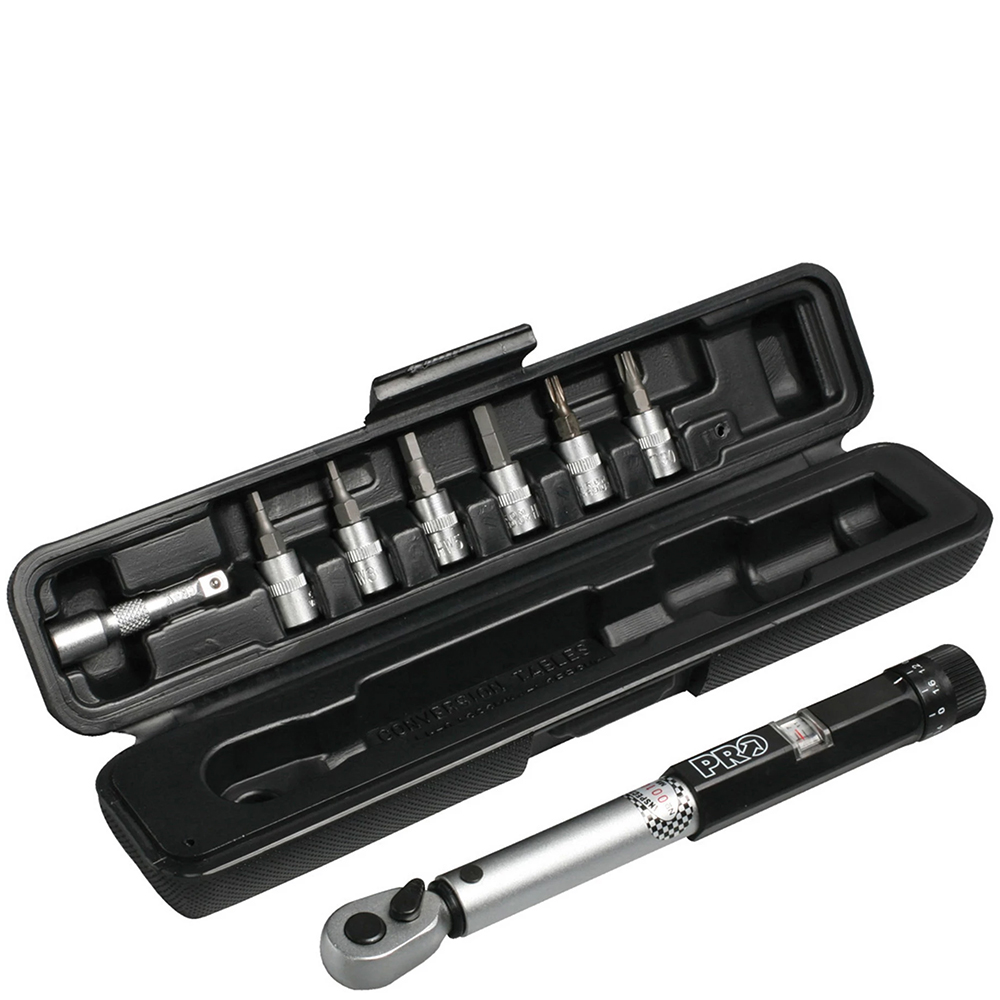
Best wrench for mid-range bolts
A quality feeling wrench that has a 3-15Nm torque range, with a scale you can set down to 0.1Nm.
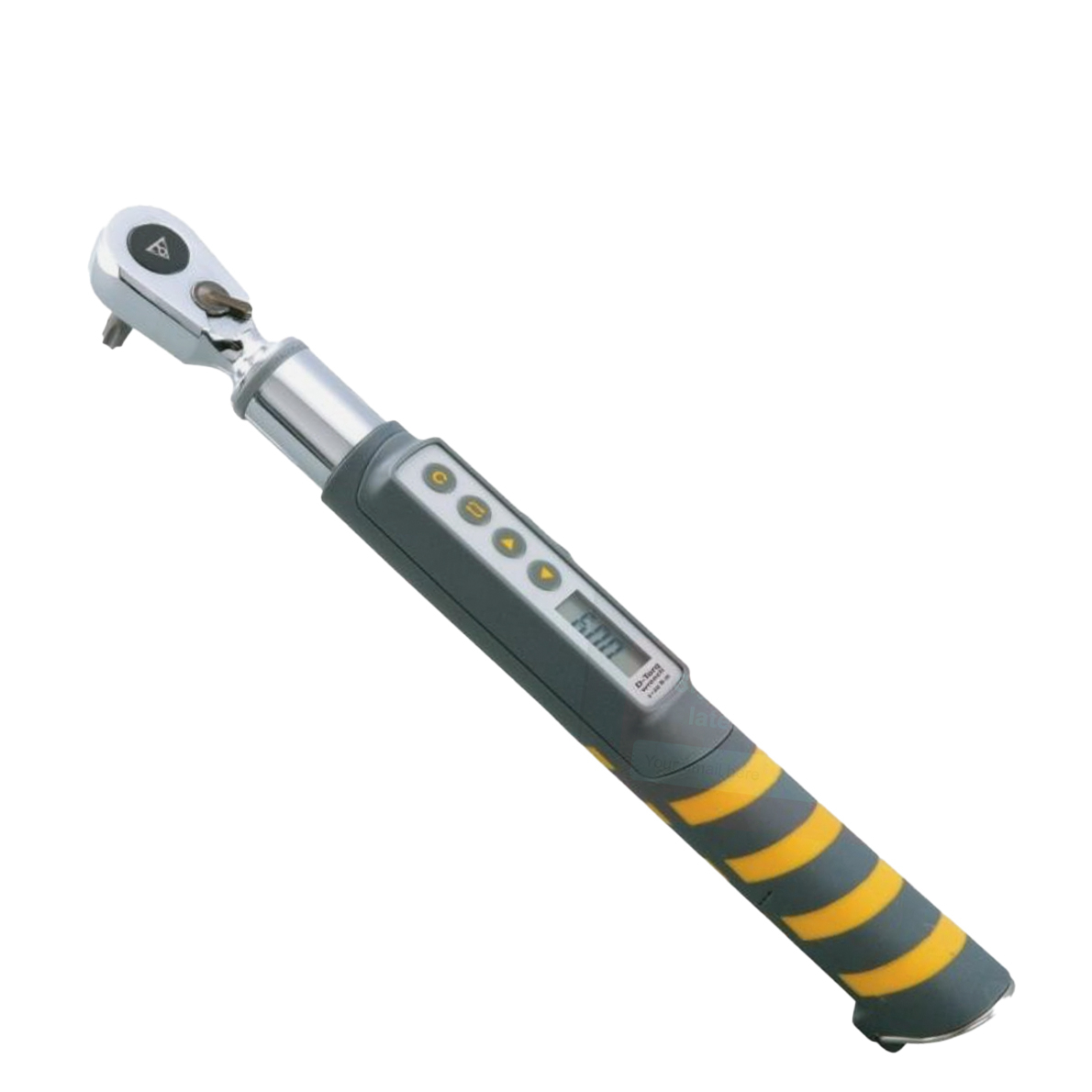
Best digital wrench
This digital torque wrench enables you to get super accurate torque readings and has a wide 1 to 20Nm range.
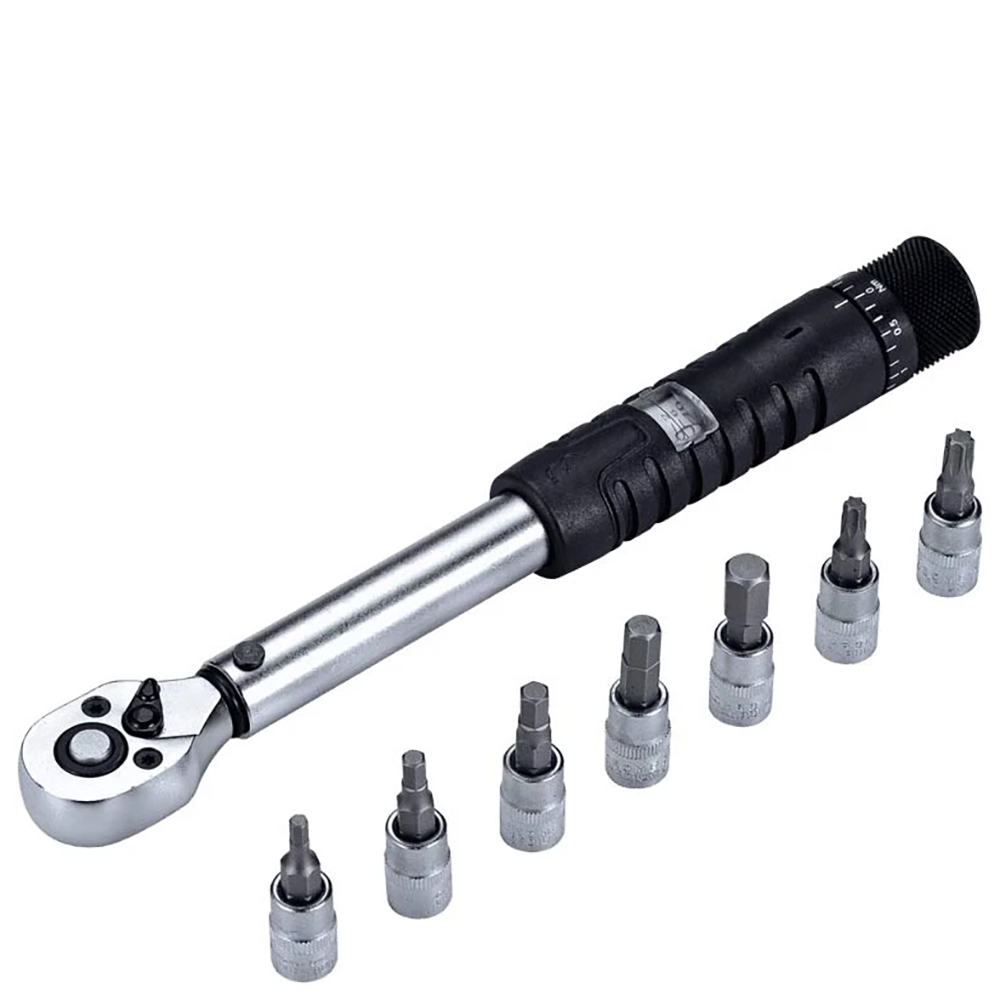
Best adjustable wrench for travel
At 21cm long and with a 2-14Nm range, a handy mid-length option to carry around with you.
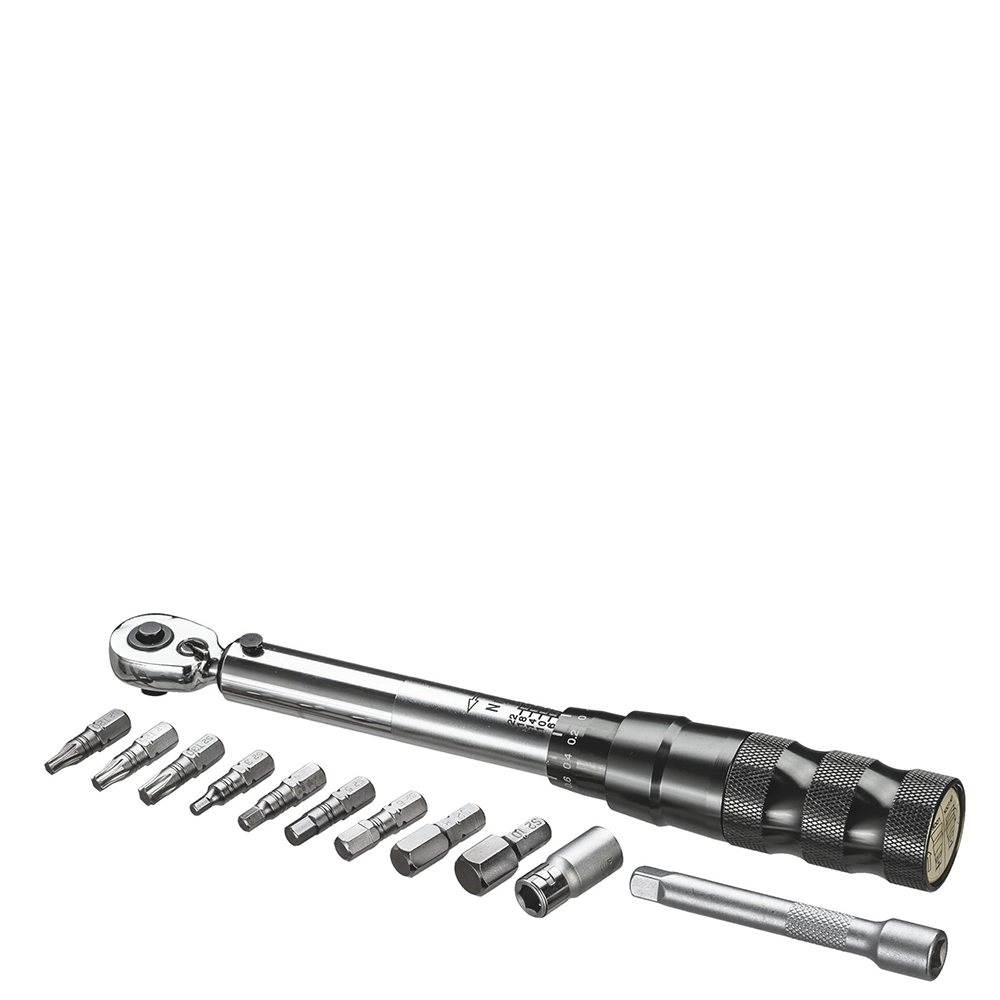
Best wrench for heavier home use
A sturdy, 22cm long wrench with a metal handle and adjuster, that's accurate and easy to set, with a range from 2-24Nm.
See the next 5 bike torque wrenches ↓
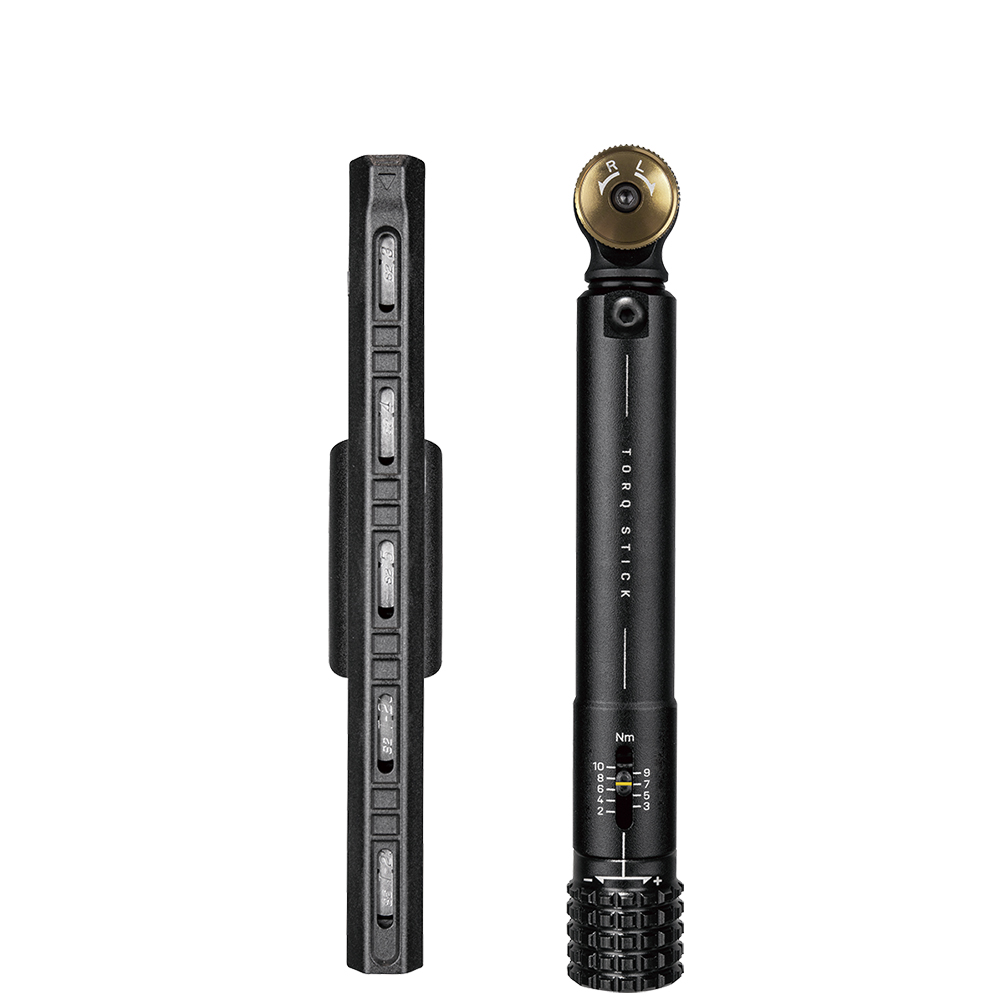
Best portable torque wrench
A useful torque range and a good portable option at 15cm, with a clip-on bit carrier and slide-off cover.
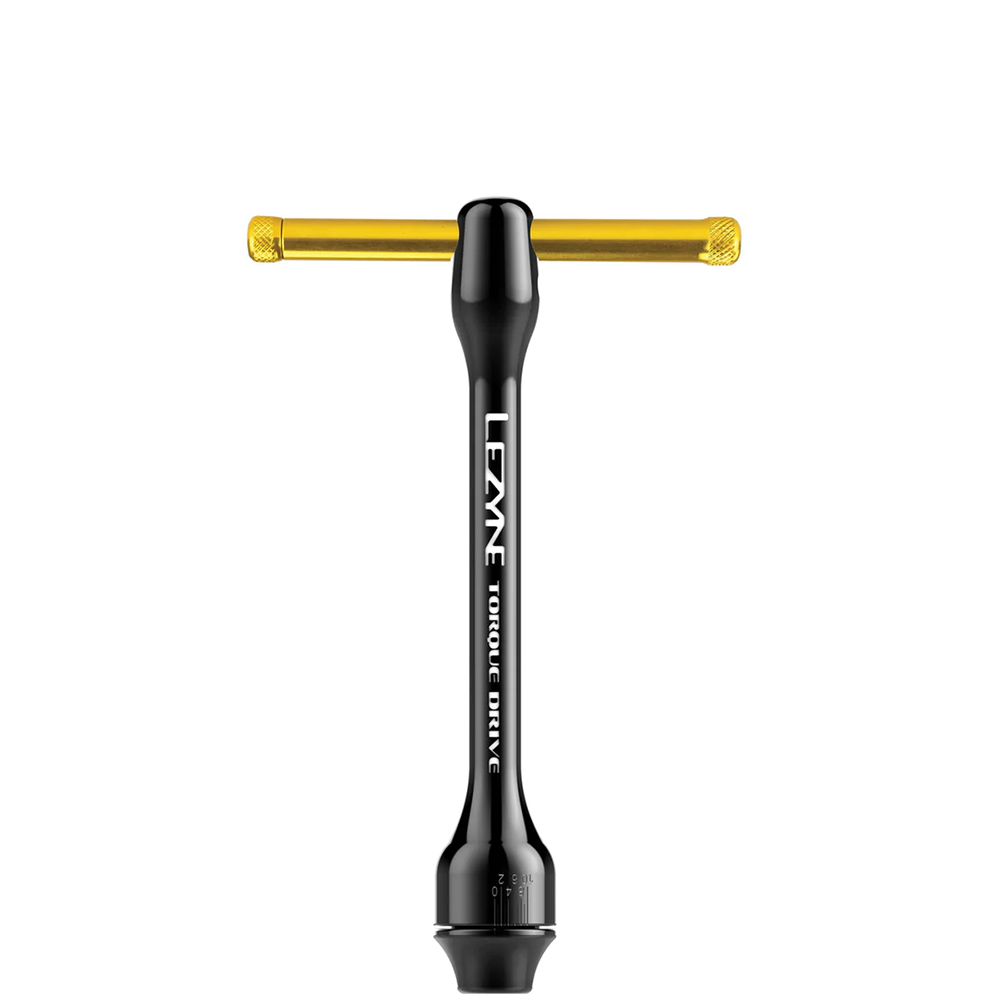
Best portable torque wrench for cool factor
A portable tool with polished looks, a handy soft pouch for carrying, and a good range of heads.
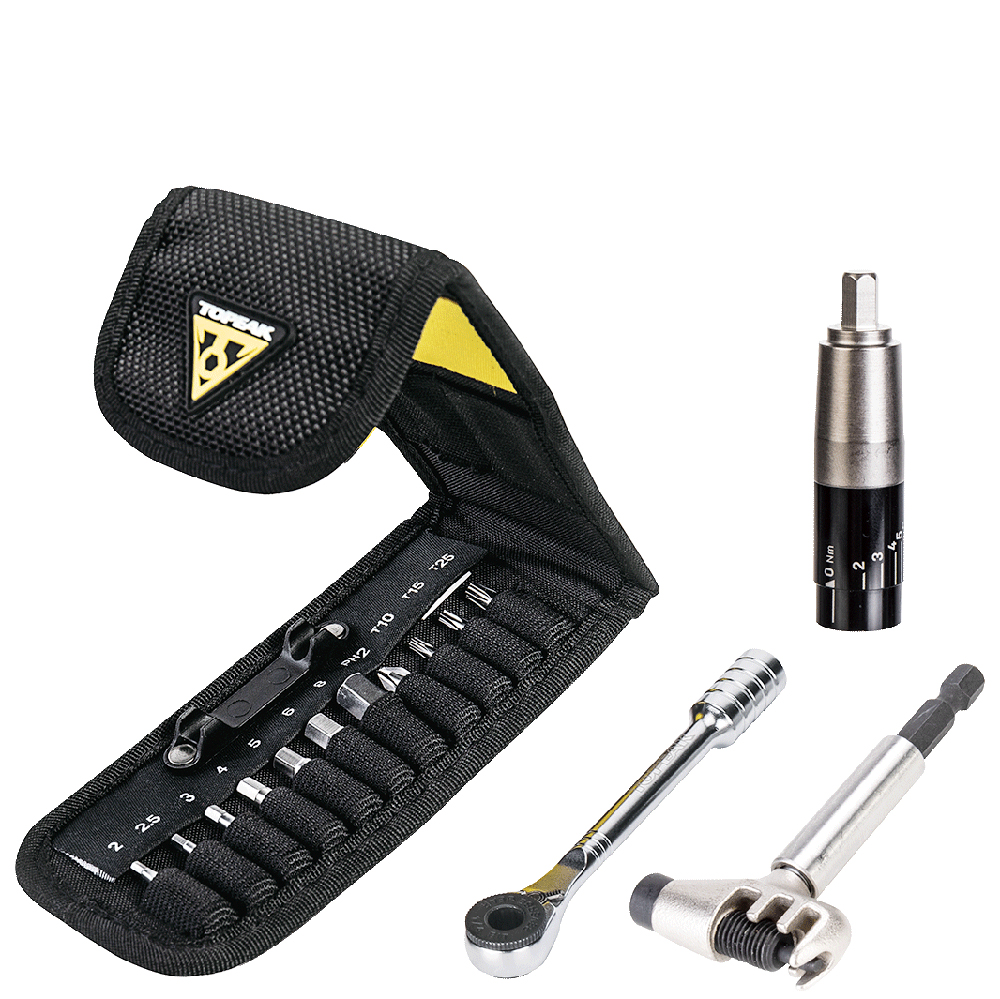
Best torque multitool
A small but fully comprehensive tool wrap takes workshop quality onto the trail at a good price.
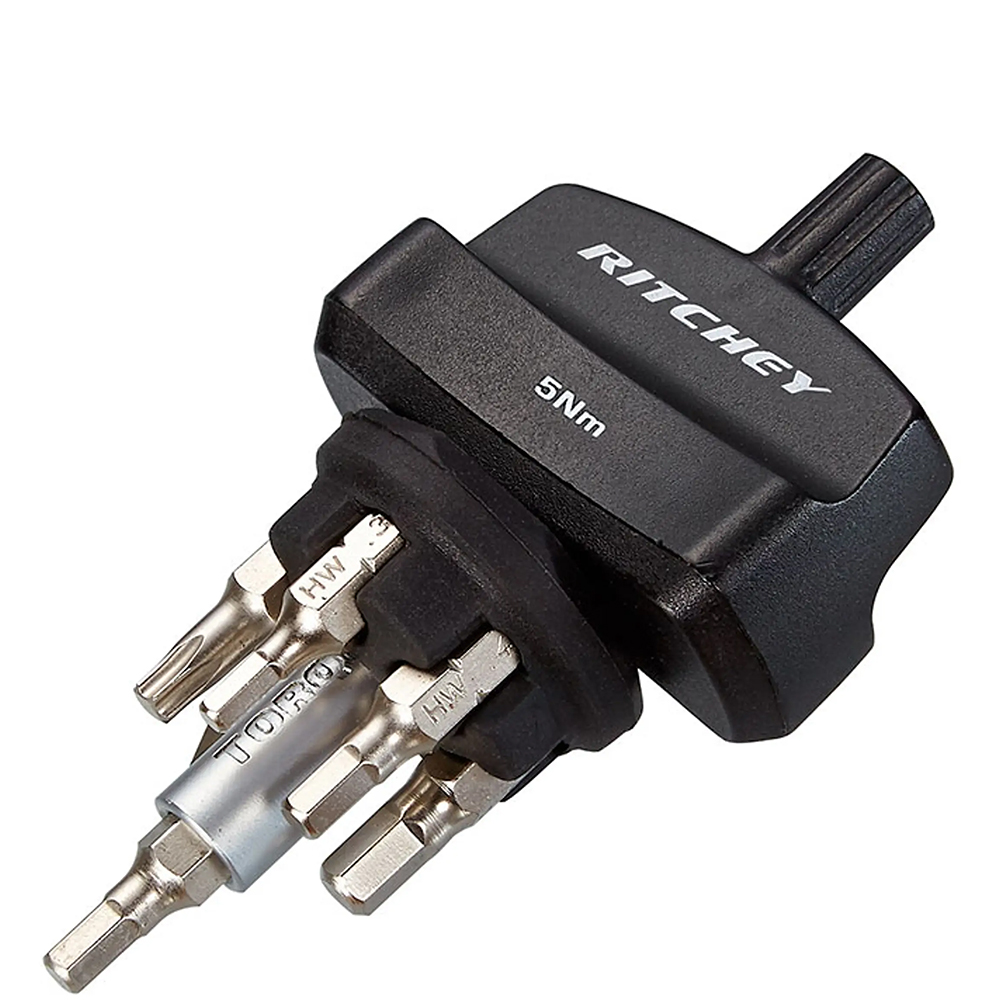
Best preset wrench with multiple bit options
A compact device with a good range of 1/4 inch hex heads to cover most small bolt options.
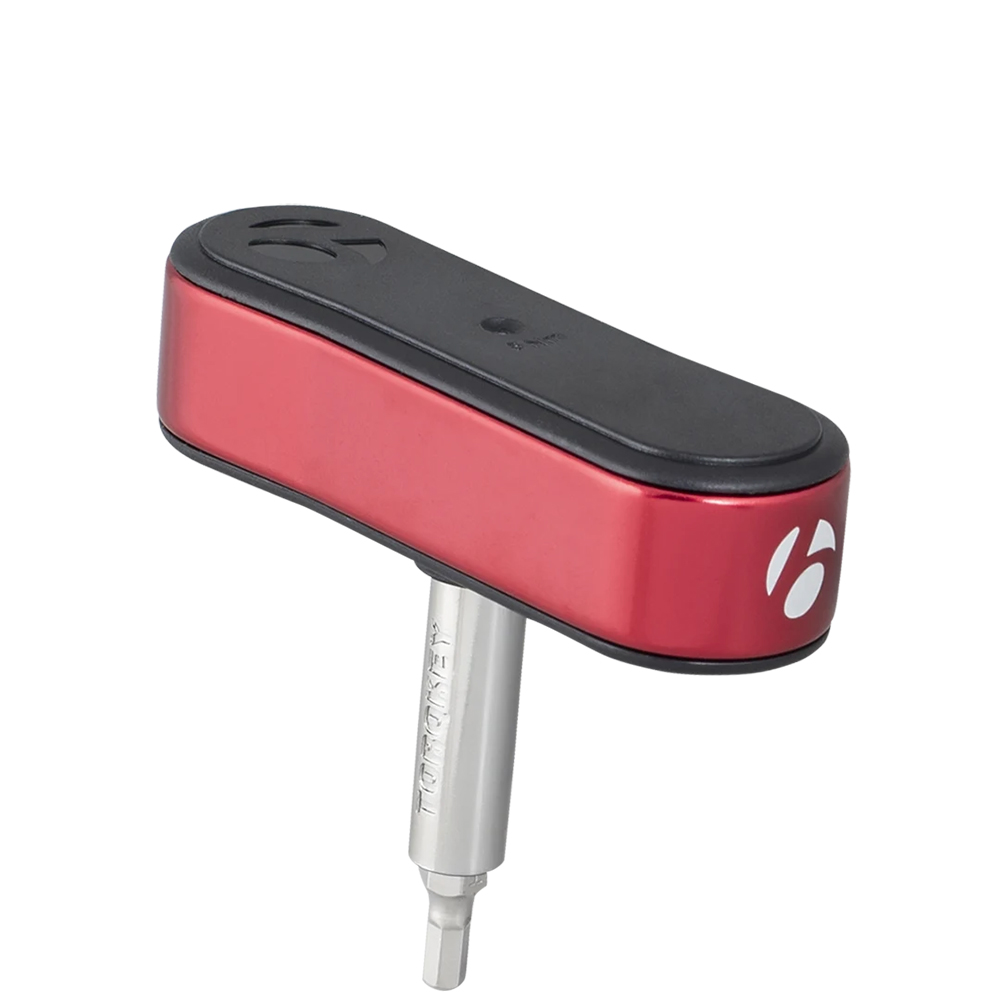
Best easy to use torque key
A durable device with a large head that gives good leverage making it easy to reach the preset 5Nm.
Adjustable wrenches
For a professional or home workshop, an adjustable bar-type wrench is a great acquisition and should give you years of reliable, accurate bolt setting.
1. Best torque wrench overall
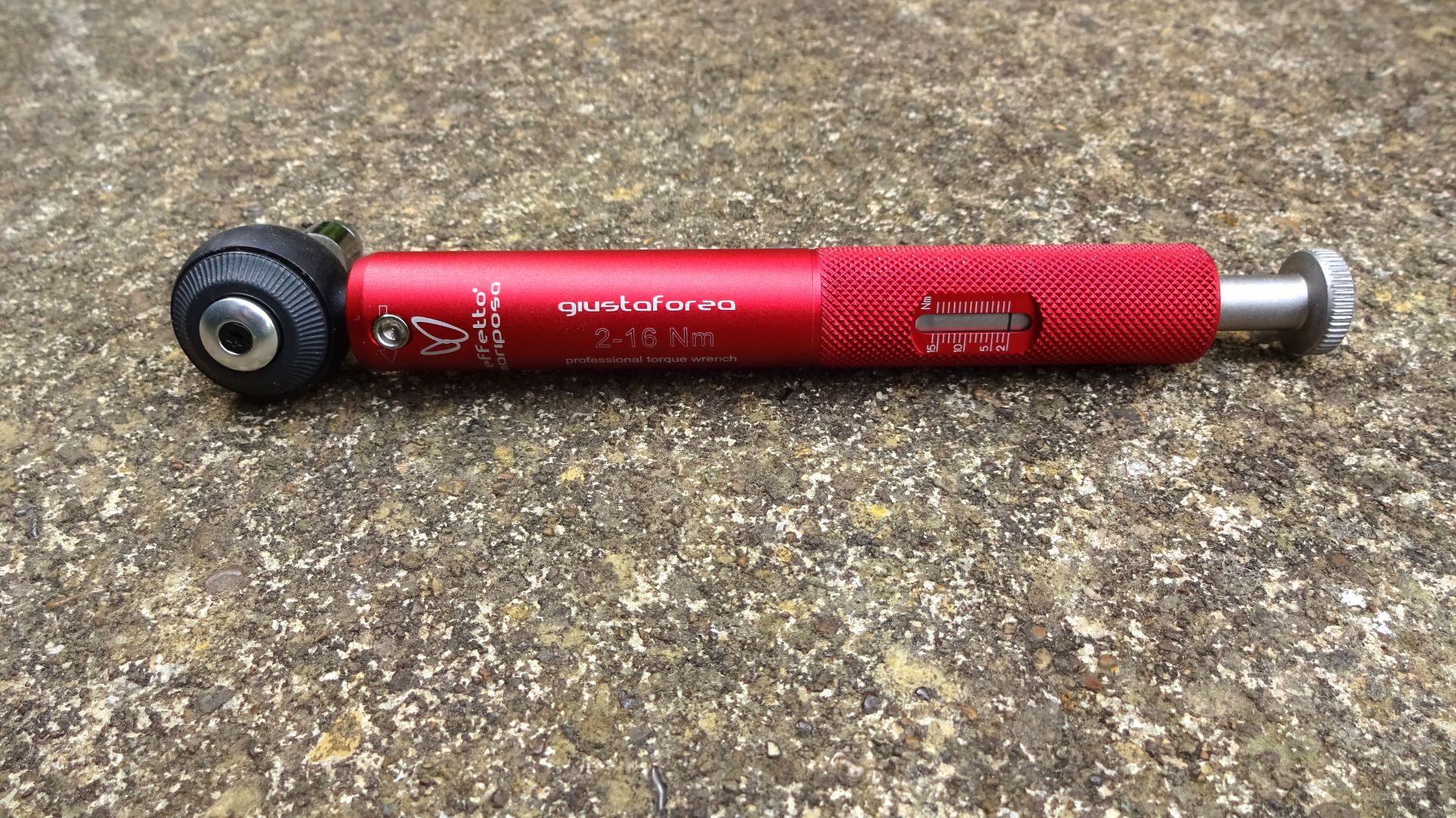
Effetto Mariposa Giustaforza Pro
Specifications
Reasons to buy
Reasons to avoid
It's obvious that a lot of thought has gone into the Swiss brand's torque wrench. You probably know Effetto Mariposa for its products that span the best tubeless tire sealants, but it has a quality range of bike tools, with the Giustaforza wrench being compact but perfectly formed for bike maintenance.
With a 14cm usable length and knurled grip surface, there's enough leverage for its 2-16Nm range while it's still compact enough to carry around in its supplied tool wrap. There's a good range of bits supplied, which use a magnetic hex interface to the wrench which is more compact than the more usual 1/4 inch square connection. You also get 100mm long versions of the 4mm and 5mm hex and T25 bits, useful for awkwardly placed bolts, and a 100mm extender you can use with the complete range of bits.
The Giustaforza wrench has quite a small window for the scale, making it quite tricky to set the torque value, and unlike many of the other wrenches tested, there's no stop to lock in the torque value and prevent it from changing by accident as you work, although the design of the adjuster knob makes this unlikely.
But overall the Giustaforza is a lovely little tool. Its high precision is guaranteed for 5,000 clicks and you can send it back to Effetto who will recalibrate it for a 50 Swiss Franc fee. There's a non-Pro version of the wrench, a narrower range 1-8Nm wrench, and a heavy-duty 10-60Nm option, so Effetto Mariposa has a torque wrench to meet all your bike maintenance needs.
2. Best workshop grade torque wrench
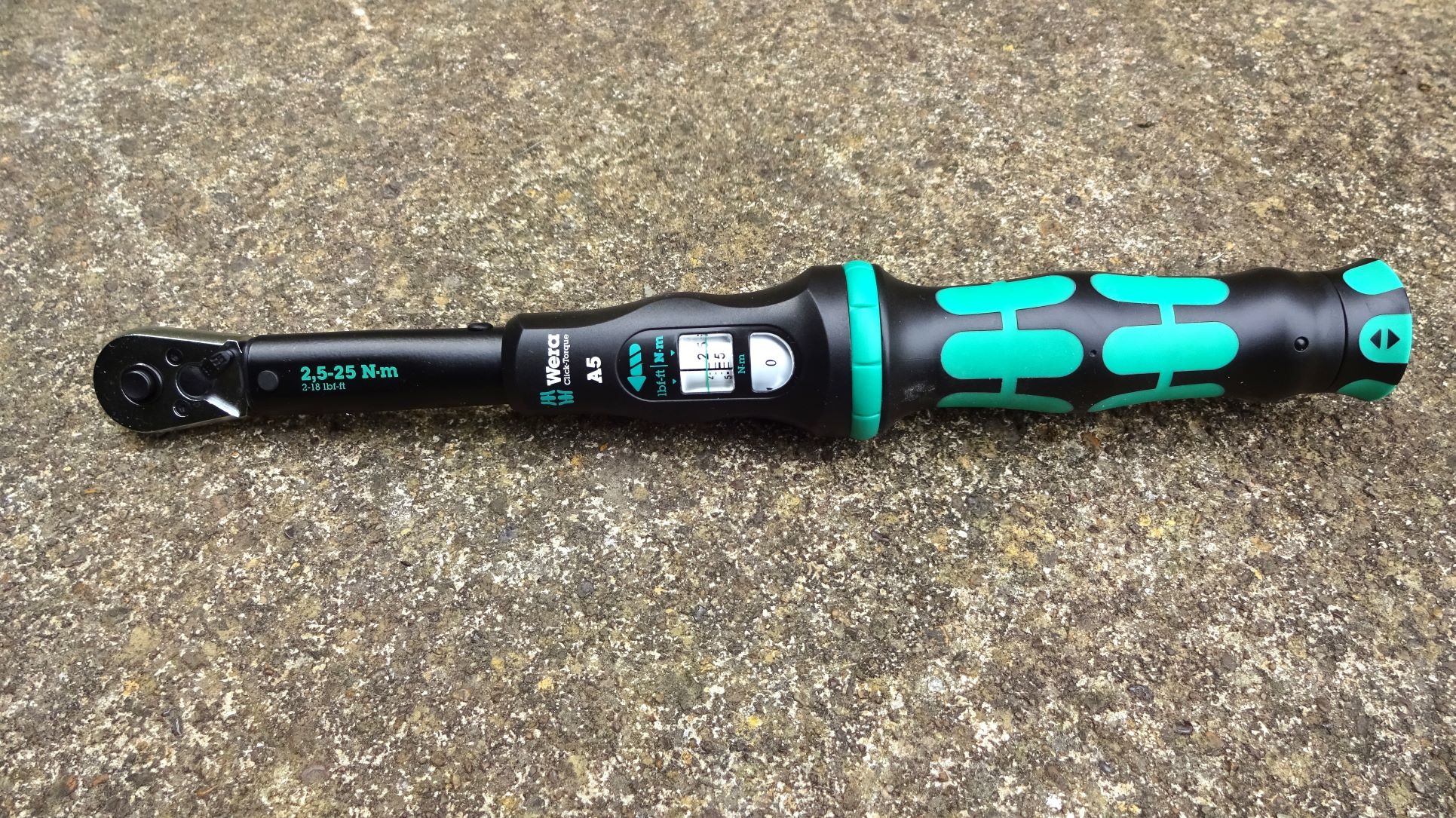
Wera Click-Torque A5
Specifications
Reasons to buy
Reasons to avoid
Wera's workshop-grade torque wrench is a thing of beauty. It feels weighty in the hand but its 18.5cm usable length and ergonomic grip give you plenty of leverage to exert its maximum 25Nm torque.
You can set the torque very precisely, with a clicking fine scale that goes up in 0.1Nm increments and that is set by pulling out the end of the handle to allow you to rotate the rest of the handhold to change the setting. Push the end of the handle back in and the torque value is locked in place.
There's a precise engagement of tool bits via the 1/4 inch chuck and the lever on the top of the wrench to release them again, and the ratchet reversing lever has a satisfyingly robust feel. Wera doesn't supply any bits with its wrench though, so you're going to have to source them yourself.
It's a pricey option, but Wera's torque wrench should give reliable service for years.
3. Best torque wrench for mid-range bolts
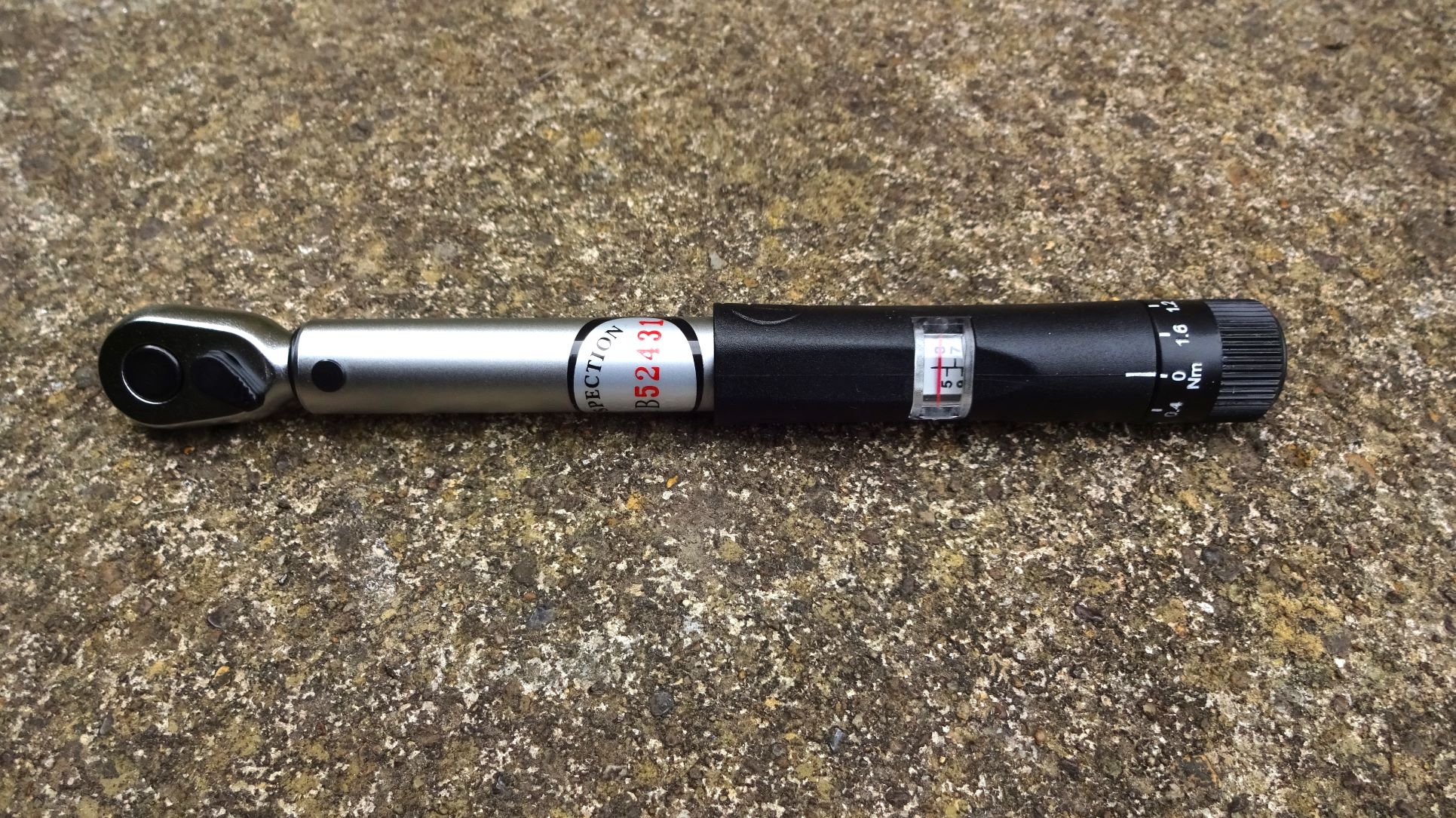
Pro Bike Tool Torque Wrench
Specifications
Reasons to buy
Reasons to avoid
Shimano's Pro component brand also sells a range of bike tools, including its torque wrench. It comes in a neat, compact plastic case that feels sturdy and is easy to pack away in your tool case.
The wrench itself is well finished, with a substantial feel to it, and its 18cm usable length and ergonomically shaped handle give you the leverage you need. Although the torque gauge window is quite small, it's easy to read. You set the torque by pulling out and rotating the sprung end of the wrench, which is calibrated in 0.2Nm increments, although you can set it halfway between the calibration marks so you can actually set the torque down to 0.1Nm.
The set comes with a 40mm long extender bar, allowing you to reach awkwardly positioned bolts more easily. The range of four hex and two Torx bits is quite limited though, so you may find you need to buy extras, especially for smaller bolts.
4. Best digital torque wrench
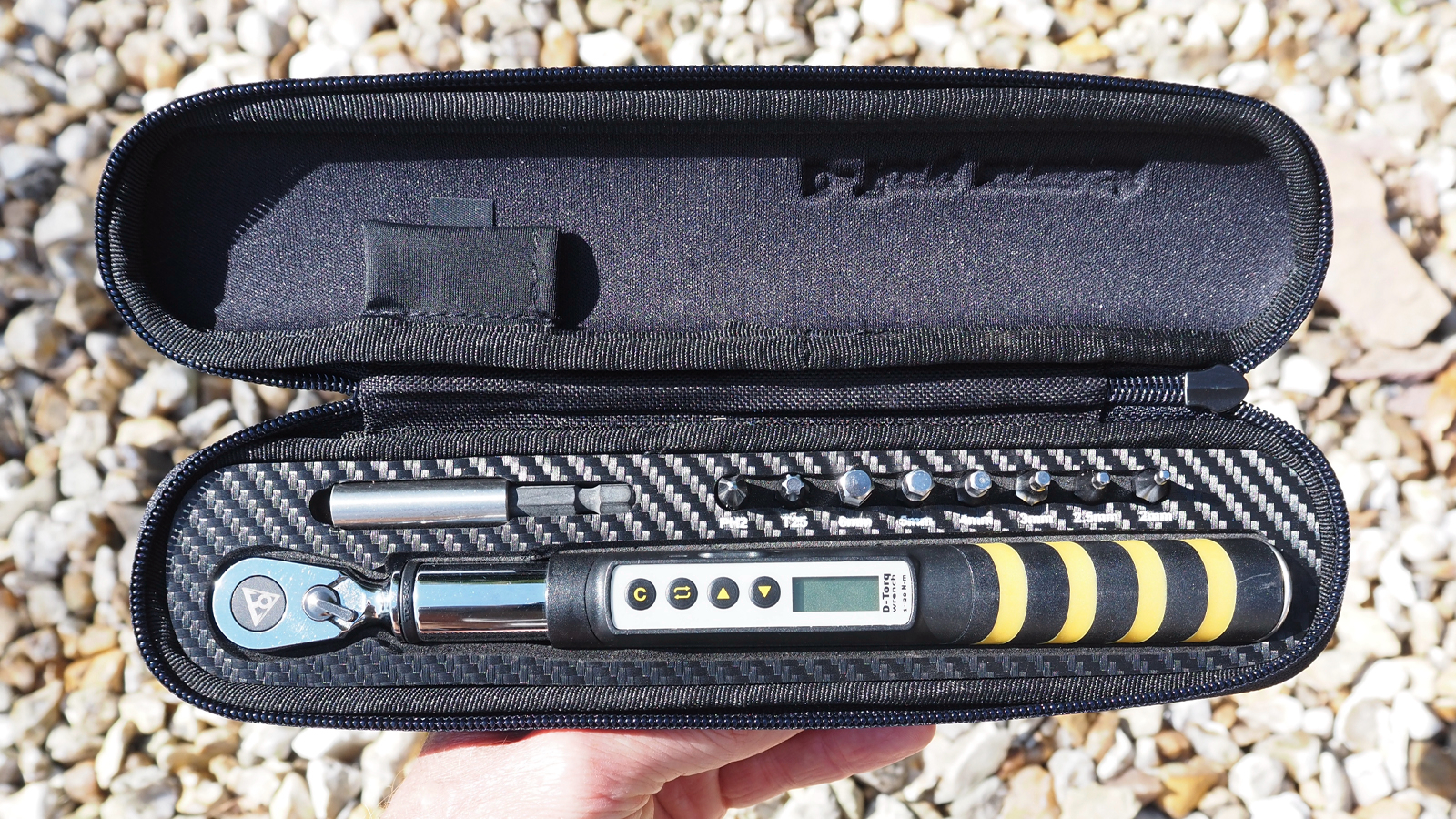
Specifications
Reasons to buy
Reasons to avoid
If you want super precise torque measurements down to two decimal places, you have to go digital. Topeak's D-Torque Wrench is one of the few bike-centric 1/4-inch digital options around (the brand also makes a 3/8-inch model) but fortunately it's a decent one.
The D-Torque comes with eight different bits that are likely to cover your needs, though you would need some additional Torx bits to work on certain bikes. Digital wrenches don't have the click of an analog model when you hit your desired preset, instead the D-Torque has a beep. In testing, we found it to be one the faint side and it could be missed if you're not paying attention.
One other issue is that the LCD screen is tricky to read in low light as its not backlit, it's also pretty small, so if you have eyesight issues you may struggle to read it.
Aside from that, it's a highly accurate and very well-made piece of kit that proved itself in the workshop. The price for a digital model is much higher than conventional versions though.
For more, see our full Topeak D-Torque Wrench review.
6. Best torque wrench for travel
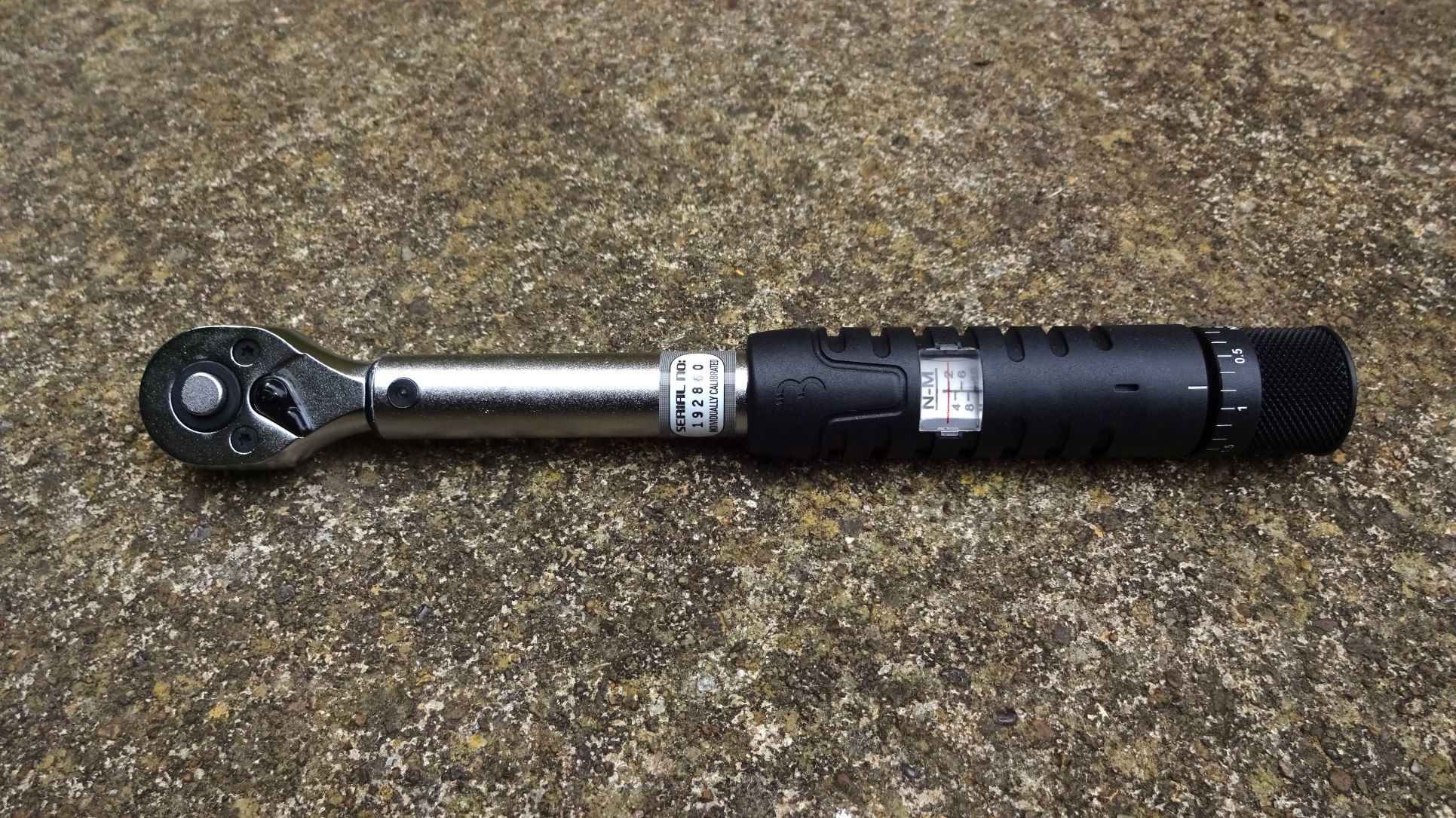
BBB TorqueSet
Specifications
Reasons to buy
Reasons to avoid
At 21cm long and with a 2-14Nm range, the BBB TorqueSet wrench is another mid-length option that's well suited to use on more delicate bike bolts. The nicely weighted handle includes the gauge window, while the sprung end is pushed in to set torque and has a scale that reads in gradations of under 1Nm, although, with six marks for 1Nm, it's not quite showing 0.1Nm accuracy. The end springs back out to lock in the set torque value.
The ratchet head reversing lever works smoothly and there's a button on the back of the 1/4 inch chuck to release the driver bits. As with the Pro wrench, you get a fairly limited selection of these in the neat, zippered padded pouch, so you may find yourself investing in extras, but the BBB is another tool that's handy to carry around with you in your traveling tool kit.
7. Best torque wrench for heavier use
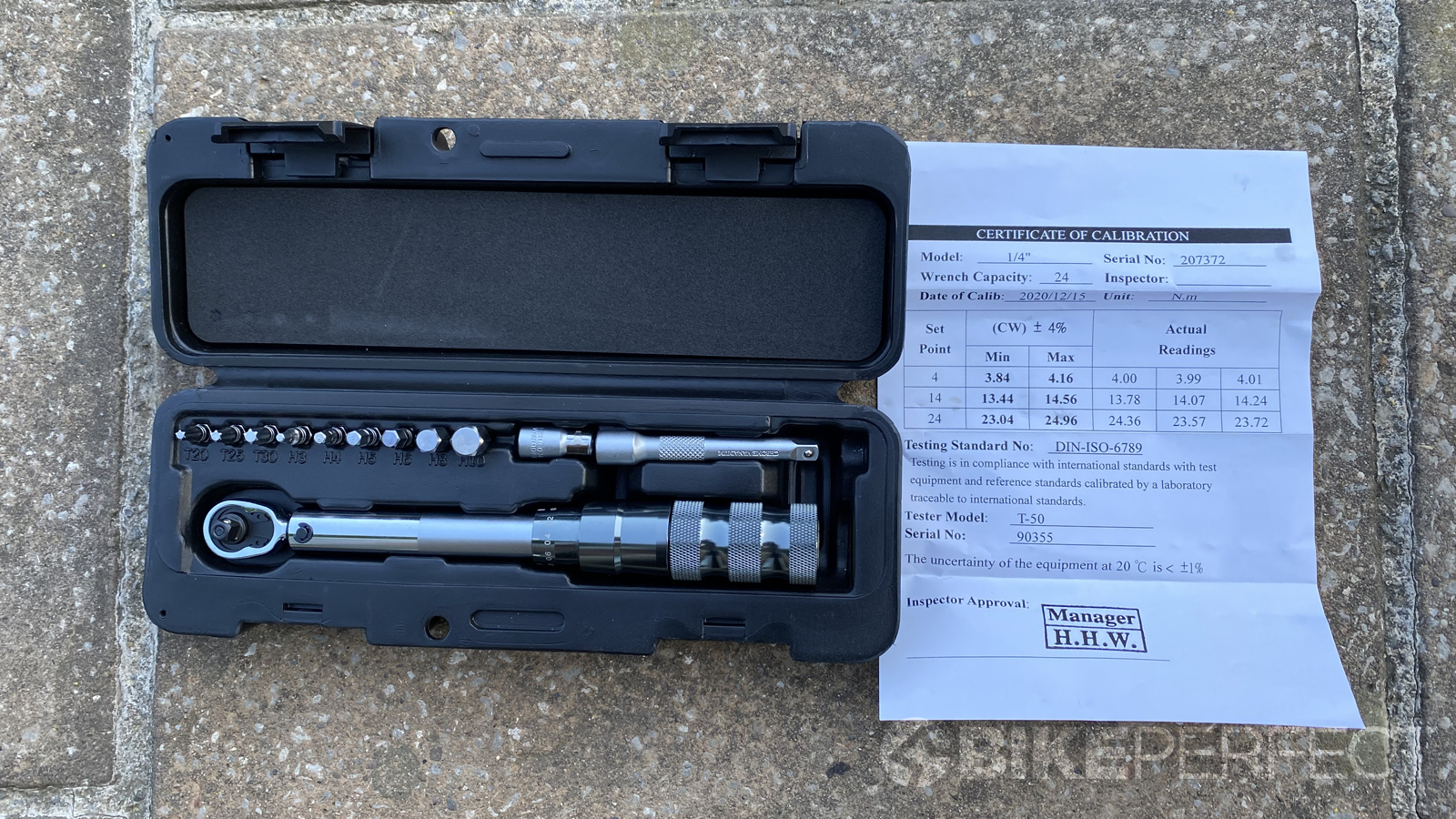
Specifications
Reasons to buy
Reasons to avoid
At 22cm long, the Syncros wrench is slightly longer than the other bike-specific tools reviewed, giving you that bit of extra leverage to tackle heftier tasks in its wide 2-24Nm range. You get a reasonable range of bits too which veer towards the larger size of the hex head range and include a 75mm extender; as with many of the tools here you may need to invest in smaller-size hex bits to complete your set.
The Syncros wrench has a pull-up fine gauge that lets you lock in your desired torque in 0.2Nm increments. We liked the metal handle and adjuster, which should stand up to workshop use better than one made of plastic.
For more information, read our full review of the Syncros Wrench 2.0 Torque.
Compact torque wrenches
If you need to make adjustments to your bike while out and about, you have the option of taking one of the best mountain biking multitools to it and hoping that you've got the torque right. A better option is a compact torque wrench set that you can carry with you to be sure that you've tightened components to the right torque value.
8. Best mini torque wrench overall
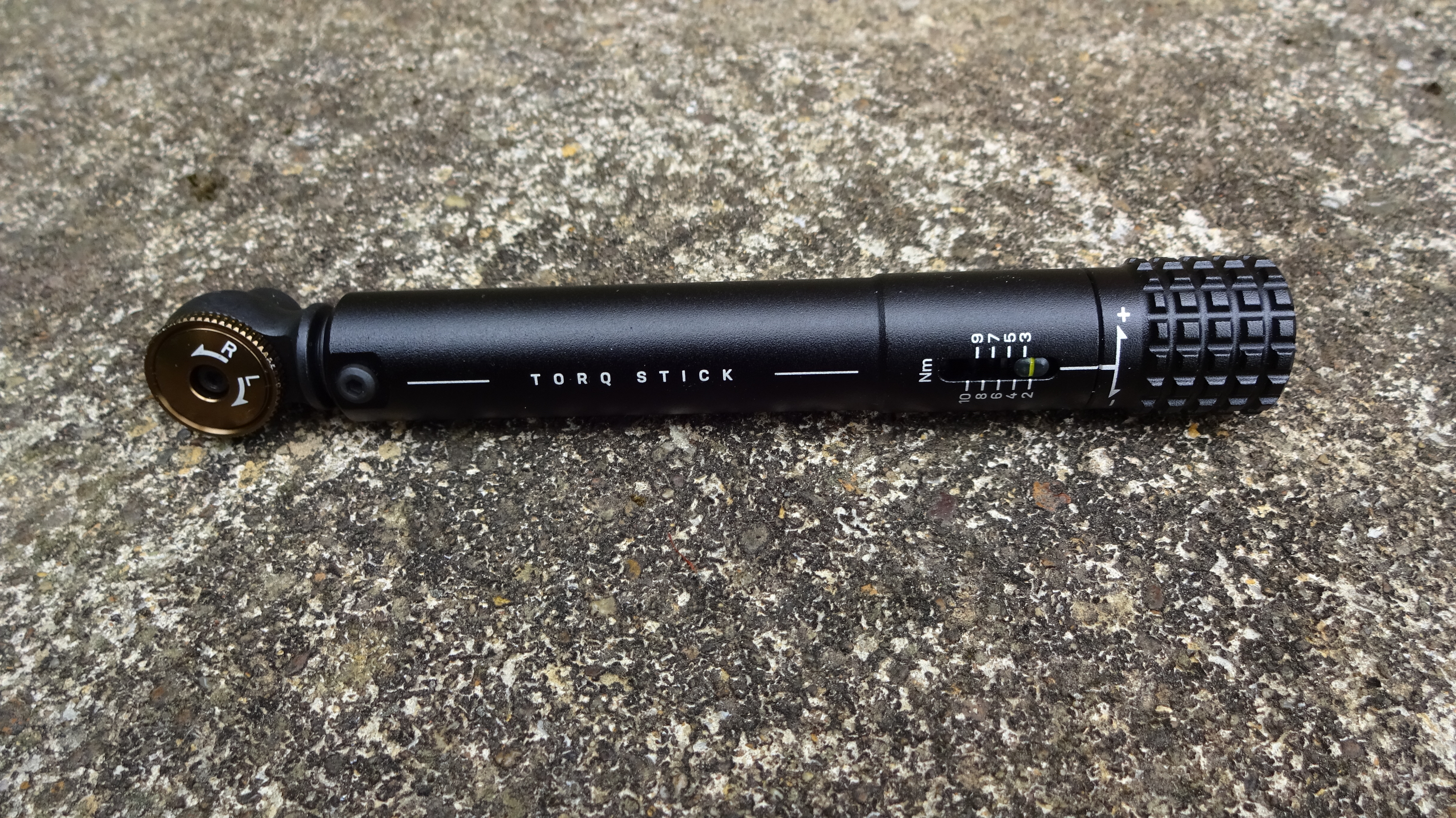
Topeak Torq Stick
Specifications
Reasons to buy
Reasons to avoid
Neatly straddling the boundary between workshop tool and portable torque wrench, the Topeak Torq Stick is short enough at 15cm to stash in a pack, but still has plenty of leverage for its 2Nm to 10Nm range.
Its portability is upped by the accompanying clip-on bit storage, which holds five hex heads, with a slide-off cover to stop them from getting lost in your pack. The wrench on its own weighs 128g and the stored bits only up that to 172g, so there's not much weight to carry either.
The Torq Stick has a gauge that's easy to read, with a sprung, locking end to set the torque. There's a 0.5Nm set-point marked on the rear side of the wrench, so you can set the torque down to small increments and the circular ratchet reversing lever is large and easy to use. That gives you extra precision over other portable wrench options like the Lezyne without additional weight.
Topeak provides a set of five bits with the wrench, three hex, and two Torq. They may not be the most useful for many bikes, but new bits are inexpensive so you can easily add those you need and tailor what you carry to suit your bike.
9. Best compact design torque wrench
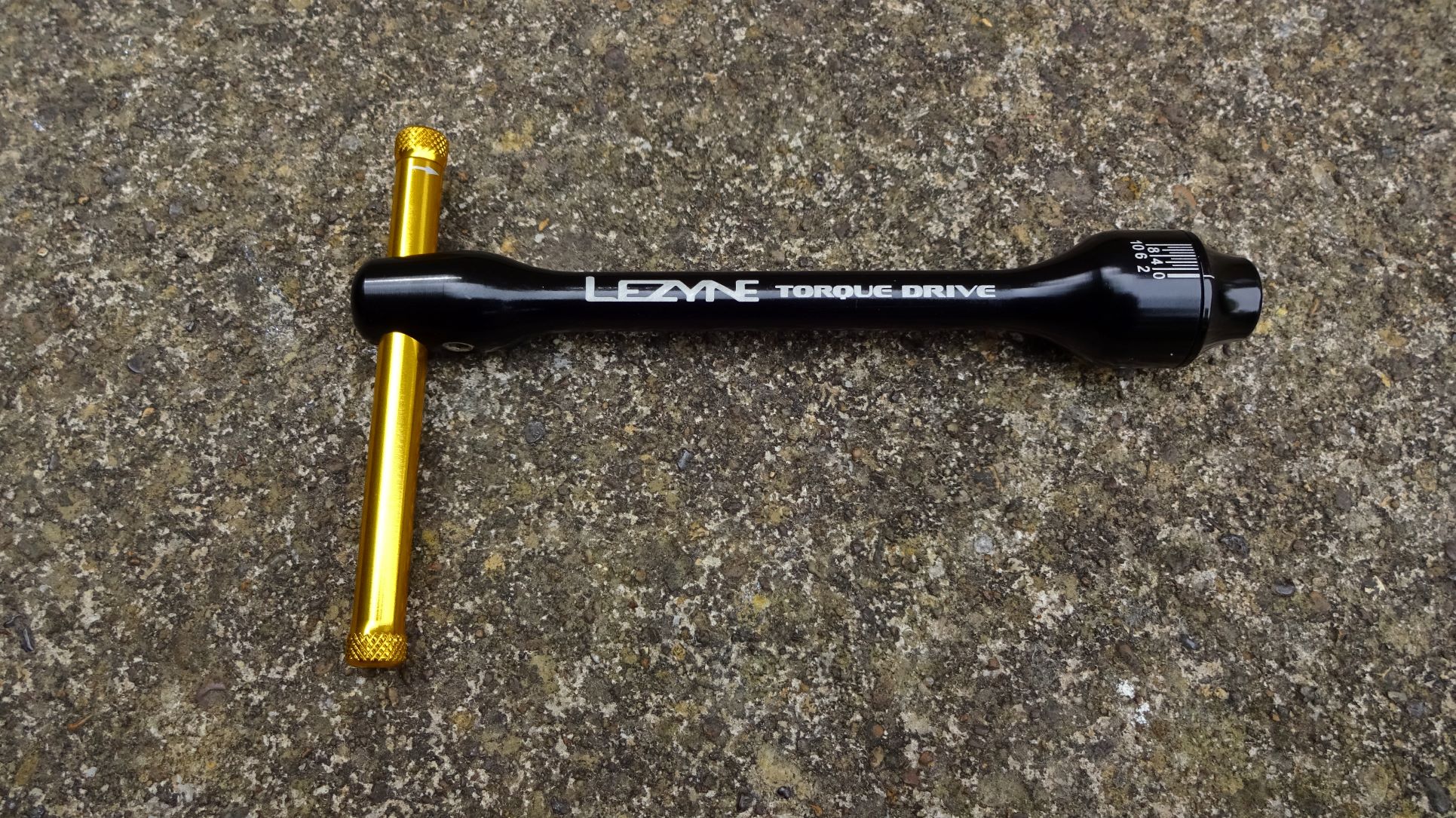
Lezyne Torque Drive
Specifications
Reasons to buy
Reasons to avoid
The Lezyne Torque Drive tool has the polished look of all the brand's range of tools. Presented in a handy soft pouch it's easy to slip into your pack and take with you and its 178g weight isn't going to weigh you down unduly.
Inside, there's the tool itself – a black 14.5cm long dumbbell-like piece, along with a gold anodized handle. You need to unscrew the end of this and insert it into the tool, then screw the end back in, which is a slightly fiddly precursor to using the tool.
Like Effetto's workshop tool, the Lezyne Torque Drive uses a hex interface with the bits held in place magnetically. There's a good range of options including finer 2mm and 2.5mm hex bits, a T10 Torx, and two screwdrivers, so you're well set up to work on finer bolts while out on the trail.
On the head of the Torque Drive there's a finely etched torque scale. You don't get a preset, but the etched torque indicator moves over this as you tighten the bolt, so you can see when you've reached the correct torque.
Unfortunately, the scale markers are very close together, making it tricky to be certain that you've got it right though. The gradations on Topeak's equivalent torque head are a lot more widely spaced and consequently easier to discern. The Lezyne Torque Drive definitely wins out on cool factor though.
10. Best torque multitool
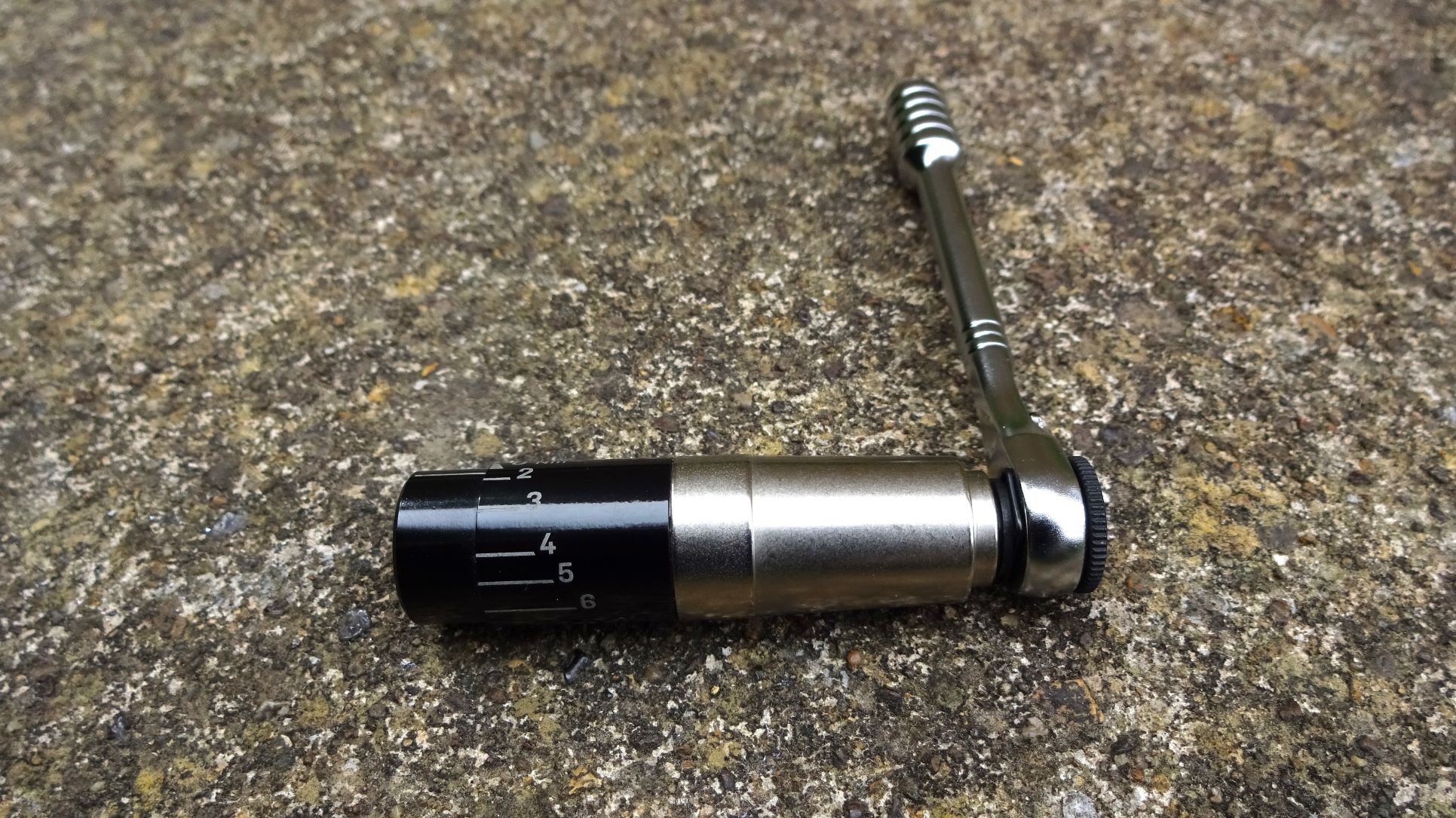
Specifications
Reasons to buy
Reasons to avoid
Slightly more compact than the Lezyne Torque Drive, the Topeak Ratchet Rocket Lite NTX+ weighs almost 70g more at 246g. But that extra weight does give you extras including a chain tool and a reversible ratchet.
Everything in the Ratchet Rocket Lite NTX+ is miniaturized, with a short 8.5cm usable length reversible ratchet that has a reversing lever that's slightly fiddly to use. You can just slot the broad range of hex and Torx bits or the Phillips screwdriver bit into the ratchet, but you can also insert the included TorqBit between them, giving you a calibrated range from 2Nm to 6Nm.
Although that's less range than Lezyne gives you, it's far easier to read the scale as it's much more widely spaced, so you can confidently get down to the nearest 0.5Nm. Like the Lezyne tool, it does tend to end up positioned so that it's on the far side of the tool from you though, making it awkward to read.
Check out our full review of the range-topping Topeak Ratchet Rocket Lite DX+.
Preset torque keys
Many critical bolts on many bikes need to be tightened to 5Nm. So if you're only likely to be making occasional adjustments to parts like seatposts and stems, a preset torque key might fit the bill and save you plenty of cash.
11. Best preset torque key overall
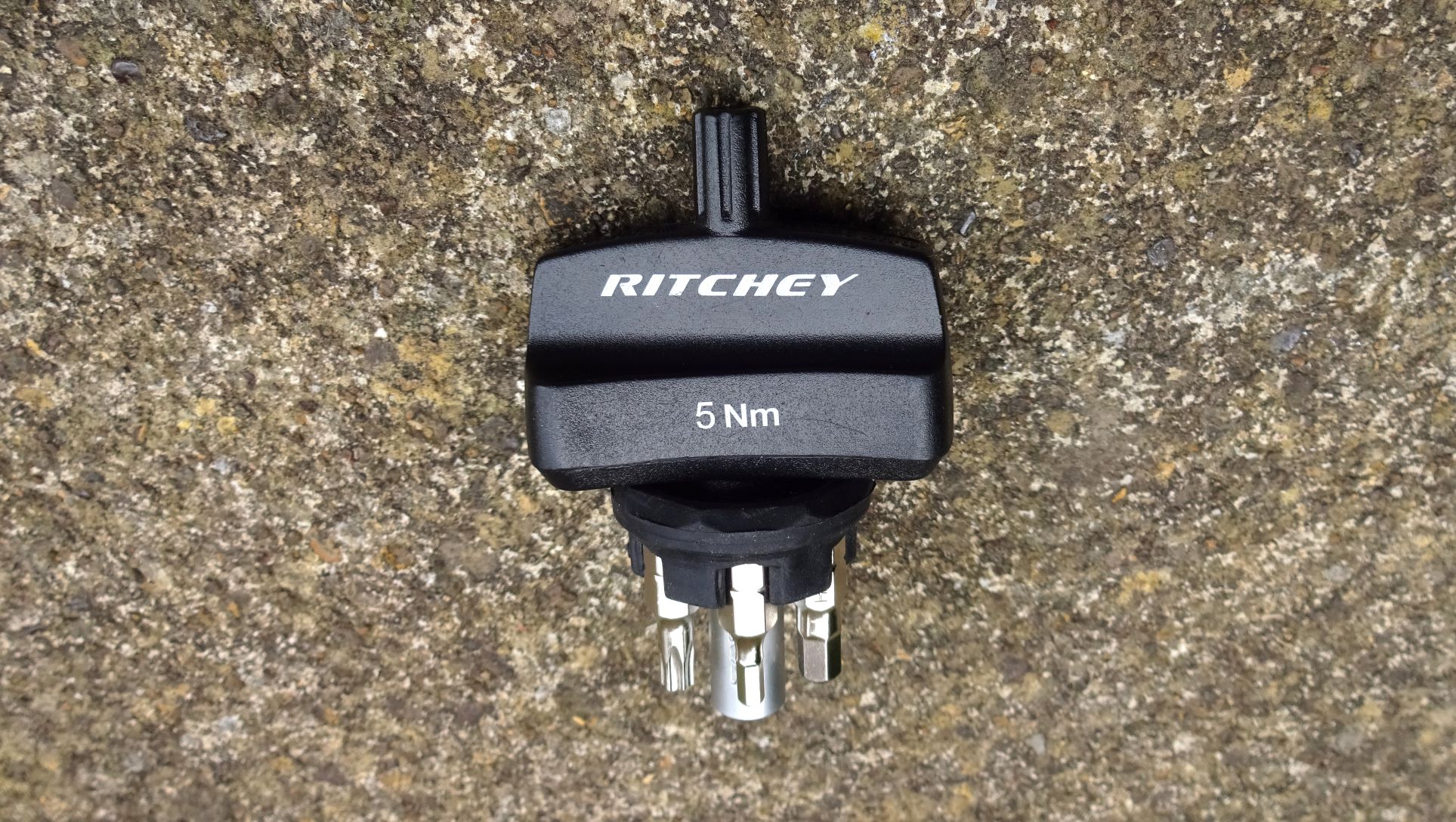
Ritchey Torque Key
Specifications
Reasons to buy
Reasons to avoid
The Ritchey Torque Key is available with 4Nm or 5Nm presets. It's a compact device that won't take up too much storage space or that you could easily carry in your pack.
Usefully, Ritchey includes a good range of 1/4 inch hex bits, so you're set up to tighten 3, 4, or 5mm hex bolts as well as T20s, T25s, and Phillips screws, which should cover most small bolt options on most bikes. The rubber holder does a good job of keeping them all in place so it should be hard to lose any.
With its compact dimensions, the drawback of the Ritchey Torque Key is that there's a small handhold and leverage isn't that good even on easy-to-reach bolts. That, combined with its relatively low torque preset, makes this a tool for occasional use that you'll likely find uncomfortable if you're making more frequent adjustments.
12. Best single-function torque key
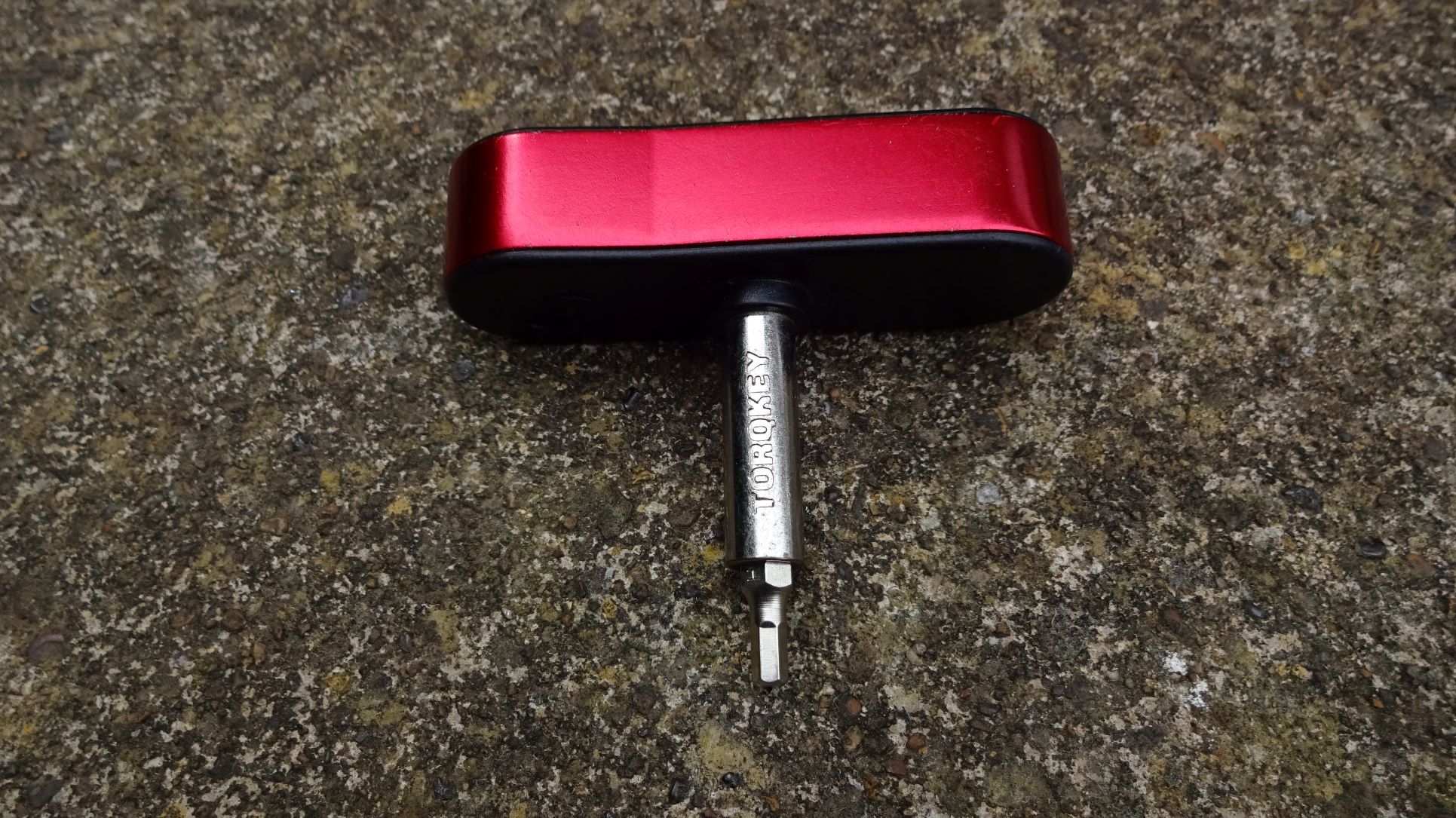
Bontrager Preset Torque Wrench
Specifications
Reasons to buy
Reasons to avoid
The Bontrager Preset Torque Wrench gets over the Ritchey's model leverage problem, with a much larger head that's easy to grip between your index and middle finger for a far more comfortable hold so that it's easier to reach the preset 5Nm. There's a 6.8Nm option (why 6.8?) available as well if your bolts need extra tightening.
The flipside of the Bontrager Preset Torque Wrench is that it only has a set-in 4mm hex bit. That's good for the majority of standard stem and seatpost bolts though and we've sorted and adjusted myriad bikes using Bontrager's tool. However, an array of smaller bolts, Torx heads, and lower torque values seem to be sneaking into modern bike designs. But for the occasional fettler on a standard bike configuration, the Bontrager Preset Torque Wrench may be all that's needed.
How to choose the best bike torque wrenches
Why do I need to use a torque wrench for my bike?
If you're doing any work on your bike yourself, a torque wrench is an invaluable tool. Most bike parts are made either of alloy or carbon fiber. That means that they're soft and it's reasonably easy to strip the threads from an expensive bike part by overtightening a bolt.
That can have serious consequences not just for your wallet, as many bolts, particularly those in stems are safety-critical, so it's important to get them tightened to the manufacturer's specifications.
There's a danger in under-tightening bolts, too, as parts can slip and again there's the risk of a bolt failing if it's loose and the forces on it are not what it was designed for.
Even if you avoid an accident, you might void your warranty if you've not followed instructions when adjusting components.
What types of torque wrenches are there?
Torque wrenches fall into three types: adjustable torque wrenches, portable torque wrenches, and preset torque keys.
Adjustable torque wrenches are high-precision workshop tools, some of which are found in the best mountain bike toolkits, that let you precisely preset the torque value you want to achieve before you start to tighten a bolt and give you a click as feedback once you reach it.
Portable torque wrenches are designed so that they're easier to carry than a workshop torque wrench, but still let you set a specific torque value, using non-preset calibrations on the tool.
Like an adjustable torque wrench, a preset torque key will also give you feedback when you've reached the correct tightening force for a bolt, but you can't adjust the torque value at which this occurs.
What range does a torque wrench for bikes need to cover?
Bike parts are a bit awkward. Since they're made of soft materials, small bolts normally require quite a low torque figure, with bolts on seatposts and stems typically requiring around 5Nm and some proprietary parts going as low as 2Nm. Typical ranges for small bike parts go from 2Nm up to 20Nm.
That's not a range that many mass-market torque wrenches cover, so don't expect to be able to use a torque wrench from an auto parts shop on your bike. Likewise, bike bolts are often small and have hex or Torx heads, so you need specialized bits to fit them, while access may be an issue. So you'll probably need a specialist bike torque wrench to adjust small parts on your bike.
On the other hand, if you're planning to work on larger components like bottom brackets, drivetrain, and pedals, specified torque figures are usually a lot higher, often around 40Nm. A torque wrench that can handle low torque for small bolts often does not have a range that extends that high, so you may find you either need a second, higher-rated torque wrench or that you need to take your bike to a shop for these parts.
Do I need a torque wrench for bikes or will a preset torque key do?
That depends on what you're working on. If you just want to be able to adjust your saddle height or bar position, check the specified torque figures that are usually printed on these parts or which you can find in your owner's manual. Often, these bolts are 4mm hex and need to be torqued to 5Nm, so you'll be just fine with a preset torque key or maybe a range of different ones with different preset torque values, like those made by Topeak.
If you've got proprietary parts or you're looking to work on a wider range of components on your bike though, you may find it's better to invest in an adjustable torque wrench to cover the full range of specified torque values.
How do I know what the correct torque is for the parts on my bike?
Many smaller components, such as stems, seatpost clamps, and brake rotors, will have the required torque rating stamped on them. If you're unsure though, always check the manufacturer's website. Park Tools also has handy listings of torque settings for various components and brands on its website.
How is torque measured?
Torque is the turning force applied to an object like a bike bolt or even a crank as you pedal. Torque figures are normally measured in Newton meters, abbreviated to Nm. Although there are non-SI units for torque like pounds-foot they're not usually found applied to bike parts, so a torque wrench that measures in multiple units isn't that useful for bike maintenance.

After a spell riding XC mountain bikes Paul discovered gravel, or in fact riding a cyclocross bike across the South Downs and through the Chiltern Hills as gravel bikes didn’t exist at the time. He’s since mixed gravel and road riding, reviewing bikes and gear for Cycling Weekly for five years and also more recently writing for Cyclingnews, Bike Radar, T3 and of course Bike Perfect.
- Guy KestevenTechnical-Editor-at-Large
- Rich OwenEditor, BikePerfect
